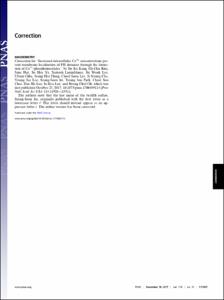Increased intracellular Ca2+ concentrations prevent membrane localization of PH domains through the formation of Ca2+-phosphoinositides
- Keimyung Author(s)
- Im, Seung Soon
- Department
- Dept. of Physiology (생리학)
- Journal Title
- Proceedings of the National Academy of Sciences of the United States of America
- Issued Date
- 2017
- Volume
- 114
- Issue
- 45
- Keyword
- Ca2+-phosphoinositides; PH domain; insulin resistance; intracellular Ca2+ concentration; membrane localization
- Abstract
- Insulin resistance, a key etiological factor in metabolic syndrome, is closely linked to ectopic lipid accumulation and increased intracellular Ca2+ concentrations in muscle and liver. However, the mechanism by which dysregulated intracellular Ca2+ homeostasis causes insulin resistance remains elusive. Here, we show that increased intracellular Ca2+ acts as a negative regulator of insulin signaling. Chronic intracellular Ca2+ overload in hepatocytes during obesity and hyperlipidemia attenuates the phosphorylation of protein kinase B (Akt) and its key downstream signaling molecules by inhibiting membrane localization of pleckstrin homology (PH) domains. Pharmacological approaches showed that elevated intracellular Ca2+ inhibits insulin-stimulated Akt phosphorylation and abrogates membrane localization of various PH domain proteins such as phospholipase Cδ and insulin receptor substrate 1, suggesting a common mechanism inhibiting the membrane targeting of PH domains. PH domain-lipid overlay assays confirmed that Ca2+ abolishes the binding of various PH domains to phosphoinositides (PIPs) with two adjacent phosphate groups, such as PI(3,4)P2, PI(4,5)P2, and PI(3,4,5)P3 Finally, thermodynamic analysis of the binding interaction showed that Ca2+-mediated inhibition of targeting PH domains to the membrane resulted from the tight binding of Ca2+ rather than PH domains to PIPs forming Ca2+-PIPs. Thus, Ca2+-PIPs prevent the recognition of PIPs by PH domains, potentially due to electrostatic repulsion between positively charged side chains in PH domains and the Ca2+-PIPs. Our findings provide a mechanistic link between intracellular Ca2+ dysregulation and Akt inactivation in insulin resistance.
- Keimyung Author(s)(Kor)
- 임승순
- Publisher
- School of Medicine (의과대학)
- Citation
- Jin Ku Kang et al. (2017). Increased intracellular Ca2+ concentrations prevent membrane localization of PH domains through the formation of Ca2+-phosphoinositides. Proceedings of the National Academy of Sciences of the United States of America, 114(45), 11926–11931. doi: 10.1073/pnas.1706489114
- Type
- Article
- ISSN
- 0027-8424
- Appears in Collections:
- 1. School of Medicine (의과대학) > Dept. of Physiology (생리학)
- 파일 목록
-
-
Download
 oak-2018-0608.pdf
기타 데이터 / 1.28 MB / Adobe PDF
oak-2018-0608.pdf
기타 데이터 / 1.28 MB / Adobe PDF
-
Items in Repository are protected by copyright, with all rights reserved, unless otherwise indicated.